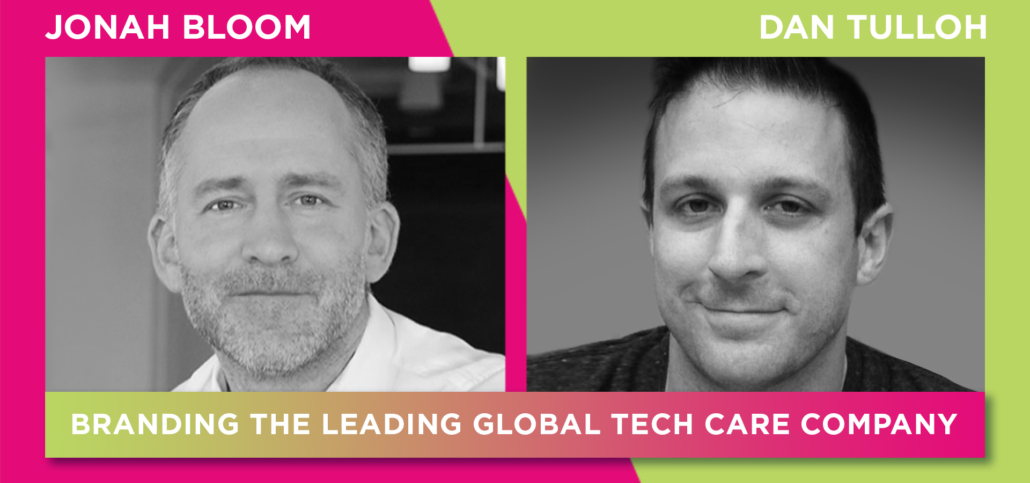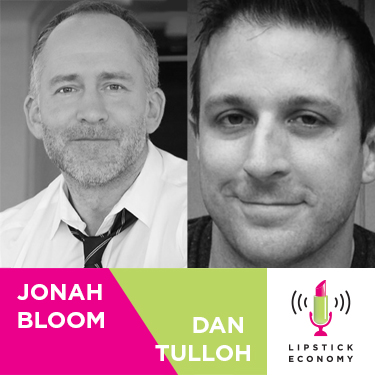Jonah Bloom & Dan Tulloh
Branding the Leading Global Tech Care Company
Meet Jonah Bloom and Dan Tulloh from Asurion, the world’s leading tech care company.
Jonah is the Chief Creative Officer and VP-Consumer Marketing for Asurion. He is responsible for growing the customer base for Asurion’s products and services. Jonah is an experienced marketing leader, who has focused on growing businesses by simplifying and humanizing the way they connect with customers. He has worked with brands like BMW and Intel and was previously editor-in-chief of Advertising Age.
Dan is the Head of Design for Asurion’s North American Product team, which is responsible for designing Asurion’s products and services. His team of 50-plus designers, writers, researchers, and engineers facilitates human-centered design principles throughout Asurion to serve the needs of their customers. Dan has led design efforts for Verizon, AT&T, Ladies Home Journal, and Sears. His work has been recognized by W3, the Webbies, and featured in several publications.
Can you tell us a little about Asurion. Who it is and what it does?
Asurion, we often say, is the largest startup in the world. We have nearly 300 million customers worldwide, but people don’t know who we are. The reason that we have a lot of customers is because our core product is providing insurance for cell phones.
But we also like to say that we’re the world’s leading tech care company because, as we’ve built those insurance services, what we’ve also built is the ability to repair people’s phones, the ability to install a lot of consumer electronics and home electronic devices, the ability to replace those devices, and within much of the country, we can replace them in a day. And we’re increasingly in the business of recycling and refurbishing those devices.
We’re looking out for all of your technology, from those cell phones all the way through, increasingly, to household appliances. Anything that’s got a power button, Asurion is trying to take care of it for people.
How important is it to have a diverse group of employees designing products?
It’s extremely important on so many levels. First, creative people want to feel safe, and they want to feel like they can be themselves. It’s universal for all people, but being creative takes a leap of faith that you can put ideas out there and that people will listen to them and accept them and not judge them.
The best ways of working is doing that in a very raw states. The best way to work, at least in my opinion, is to work through ideas very, very early and to feel safe to say really stupid things. And I do think that if you can’t see yourself in the people around you, that adds a layer of discomfort. Having a team that’s representative of you and your community is extremely important. It also breeds interesting ideas because you all look at the world in very different ways.
Our customer base is so wide that if we don’t have that level of diversity in our team and that awareness, you can make some really poor choices that can actually have horrible consequences, in some cases. Or it can put you in a position where customers feel like you understand them and their point of view, and that you can relate to them.
How did you determine what your consumer-facing marketing would look like?
As we are more and more a direct-to-consumer brand, marketing and branding never ends; it’s through the entire experience. We’re still communicating that when customers are using that product. So, if they’re filing a claim, it needs to look and feel and really deliver on that promise we make when we initially ask them – not a relationship, but for their hard-earned money.
We really try to put ourselves in the customer’s shoes. Thinking about design process, the first piece is discovery, so trying to identify and understand the problem that person is trying to solve. We try to empathize as much as possible and do as much research as we can. Through following human-centered design principles, we test and iterate on several different ways to solve that problem until we find a proposed solution that feels like it is going to work.
And we come to that through prototyping and testing with customers, sitting with them, and doing A/B tests. Then from there, we really go into a whole different mindset (some people will call it High Fidelity) where you really start to put a really amazing, crisp experience together that people love and remember. And seeing that all the way through to execution.
How do you inspire your teams and keep the fresh and educated on the newest marketing trends?
It’s an eternal question, and it’s one of the reasons I think it’s so important for people to not work all the time, actually. If you’re in a creative field, if what you’re focused on all the time is your business – and even when you’re focused on customers, you’re focused on your customers and what are they doing as it relates to an interaction with technology that we might be a part of – you’re not open to culture.
I’ve always encouraged teams to go and spend time and meet at places that are not your office and don’t have anything to do with our environment at all. Let’s live in other places and try to be in other places. And also spend enough of your time doing the other things you love and pursue the other passions – and this isn’t restricted to marketing.
We’re in Nashville, there’s understandably a lot of people who love music in our company. And you want them to be able to go and see music, to go and play music, to hear each other’s music. Really encourage people to live a full life outside of the job is so critical because they’re going to bring that with them. And make sure people take the time off.
Basically, be a decent human, but I think we forget to do some of these things when we get caught up in work.
Resources and Links
Dan Tulloh, https://www.linkedin.com/in/dan-tulloh/
Jonah Bloom, https://www.linkedin.com/in/jonahbloom/




